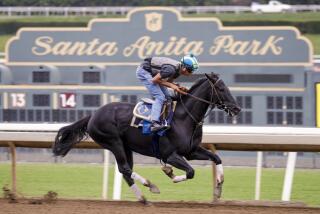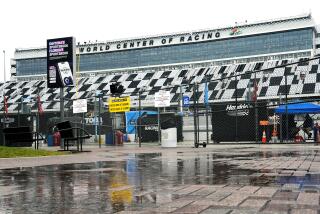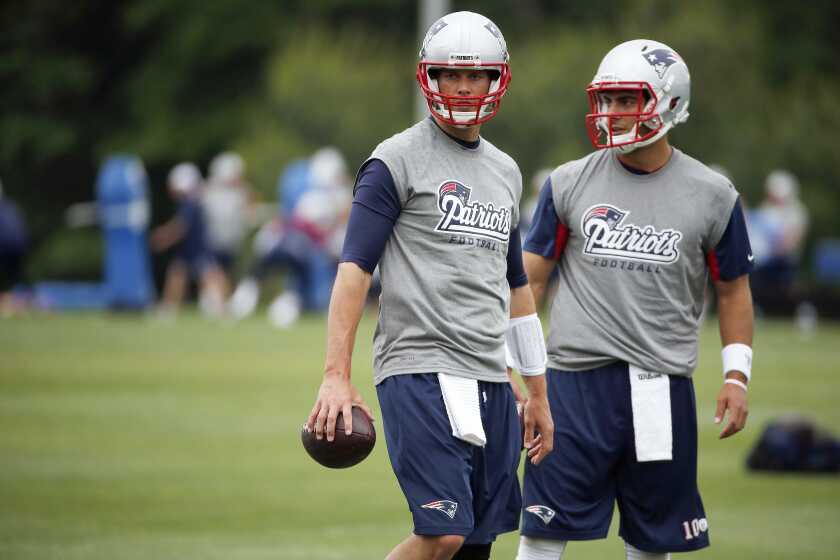SLOWING DOWN
It’s unlikely the name Joseph Schumpeter is mentioned in the garages where crew members tune the expensive race cars of Dale Earnhardt Jr., Danica Patrick or John Force.
But Schumpeter would have grasped better than most how the sport of auto racing is engulfed in financial turmoil as the 2009 season arrives.
Schumpeter, an economist who died in 1950, two years after NASCAR was founded, coined the term “creative destruction.” It means an industry often mutates, especially in times of economic upheaval, with its old structure destroyed to make room for a new one.
So he would have understood why Richard Petty’s venerable NASCAR team recently was forced to merge to survive, why the Japanese carmaker Honda abandoned Formula One racing as being too expensive, and why team financial problems left drag racer “Hot Rod” Fuller without a ride only weeks before the NHRA season opens today in Pomona.
All of the major motor racing series -- NASCAR, IndyCar, Formula One and NHRA drag racing -- are undergoing their own versions of creative destruction because of the slumping economy, just as other businesses and consumers are making big spending changes to weather the downturn.
The recession has cut into race attendance, dried up sponsorship dollars, sparked mergers among race teams now incapable of existing alone, triggered hundreds of layoffs among the surviving teams, and left the giant U.S. automakers -- the backbone of American auto racing -- teetering on the edge of bankruptcy.
“People are worried if they’ll be working next week,” said NASCAR fan Dean Stiffler of Rancho Cucamonga, who this year saved $1,500 by not renewing his two season tickets to Auto Club Speedway in Fontana.
The track hosts two weekends of NASCAR racing annually; the first this season is highlighted by the Auto Club 500 Sprint Cup race Feb. 22.
He’s not alone. The Fontana track is one of several owned by International Speedway Corp., which said last week that advance ticket sales for all its tracks were down a combined 17% from a year earlier.
And the economic mess has race-car drivers and owners routinely discussing bailouts, mergers and balance sheets instead of tires, acceleration and drafting.
“Everything in this economy has been affected,” said Rick Hendrick, owner of Hendrick Motorsports, one of NASCAR’s most prosperous teams. “We’re just going to have to see how it unfolds going through the year.”
What’s unfolded already hasn’t been pretty. Consider:
* Four NASCAR teams merged over the winter to survive the drop in sponsorship spending. Gillett Evernham Motorsports absorbed Petty Enterprises and Dale Earnhardt Inc. merged with the team of Chip Ganassi Racing with Felix Sabates.
* Dutch banking giant ING slashed millions of dollars from its Formula One sponsorship programs, and Swiss bank Credit Suisse dropped its sponsorship of the series’ BMW Sauber team with drivers Robert Kubica and Nick Heidfeld.
* Formula One’s governing group, the FIA, noted Honda’s stunning departure and said the series’ overall costs were “unsustainable” because “the global economic downturn has only exacerbated an already critical situation.”
* Veteran IndyCar co-owner Bobby Rahal, citing the lack of a primary sponsor for his team that’s also owned by talk-show host David Letterman, said the team might miss the 2009 season.
* The real estate firm ReMax International, citing the economic crisis, said it would end its title sponsorship of the second-tier ARCA stock-car racing circuit after this year.
“We’re not adjusting to a downfall in our sport, we’re adjusting to a downfall in the world,” said NASCAR driver and team owner Kevin Harvick. “Every team in the garage, every organization has looked at how they can tighten their belts.”
With unemployment rising and discretionary income falling, track owners have cut prices on selected seats and adopted other ticket promotions in hopes of keeping attendance from slipping further.
At Texas Motor Speedway, one of several owned by Speedway Motorsports Inc., “you can see NASCAR Sprint Cup races in 2009 in a reserved seat for as little as $20,” track President Eddie Gossage said recently.
No race or venue seems exempt from the economic pressure.
The Daytona 500, NASCAR’s crown jewel race, is normally a sellout. But Daytona International Speedway offered some seats for $55 each -- the lowest in more than a decade -- for this year’s 500 on Feb. 15.
The National Hot Rod Assn., the Glendora-based governing body for drag racing, also announced a “fan relief program” that included price cuts on some tickets and other discounts at certain tracks, including Auto Club Raceway in Pomona.
“People have lost their jobs,” NASCAR Chairman Brian France said recently. “They’re worried about their jobs, they’re nervous. And I think that’s what you’re seeing, the tracks trying to be sensitive to that.”
But no one knows if the moves will prevent swaths of empty grandstand seats this year.
The first true answer to that question could be evident at the Auto Club 500 at Fontana on Feb. 22, the next race after the Daytona 500.
Stiffler said his decision not to renew his season tickets at Auto Club Speedway also was because “the racing has gotten boring at Fontana,” a wide, two-mile oval where the cars often are spread apart. “If I’m going to spend that kind of money I want better entertainment. So I decided, let’s be more fiscally responsible here.”
Even if NASCAR and other motor sports have not lost their overall popularity, it’s another matter how many fans -- in the middle of a recession -- will keep paying to watch a race.
Jack Roush, co-owner of the NASCAR team Roush Fenway Racing, contended that “the disappointing ticket sales and souvenir sales are an indicator of the health of the world’s economy and not the referendum on the popularity of NASCAR.”
Instead, auto racing “has some economic challenges that are not unique to businesses around the world,” he said.
That includes Toyota. The typically prosperous Japanese automaker is now struggling as well and could see budget cuts in its racing programs, said Lee White, president of Torrance-based Toyota Racing Development. “If contracts have expired, it’s very likely that contracts have not been renewed, or if they are being renewed, they are certainly being renegotiated,” White said.
Even greater concern surrounds General Motors, Ford and Chrysler. If any of those automakers files for bankruptcy, deeper cuts in their racing programs are considered nearly certain.
For now, racing officials and others have tried to pare the sport’s operating costs to weather the recession. NASCAR and the NHRA, for instance, are among the series placing limits on testing.
Formula One is mandating that engines be used in more races. Dallara, maker of chassis and related parts for the IndyCar Series, recently cut prices up to 20% to help teams control costs.
While companies are now stingier with marketing dollars, sponsorship spending hasn’t dried up completely. Burger King recently joined the sponsors for Tony Stewart’s No. 14 Chevrolet NASCAR Sprint Cup car, which the two-time champion is driving as co-owner of the new Stewart-Haas Racing team.
But such spending is likely to be the exception rather than the rule until the economy gets healthier. That’s particularly bad news for teams that already had struggled on the track, because sponsors now want the most exposure they can get to justify their investment.
“The economy has spotlighted teams that were struggling,” France said, “and now that sponsorship is even more difficult to come by.”
--
More to Read
Go beyond the scoreboard
Get the latest on L.A.'s teams in the daily Sports Report newsletter.
You may occasionally receive promotional content from the Los Angeles Times.










